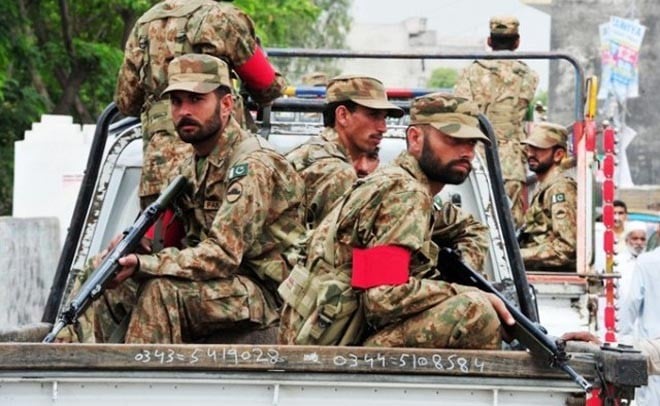

The government has finally presented a ‘National Security Policy’ (NSP) in the National Assembly which is divided into three parts to handle terrorism in Pakistan. Federal Interior Minister Chaudhry Nisar had recently presented the 100-page policy, saying it was a debatable policy and every single member had the right to discuss it as it was a national policy, not a Pakistan Muslim League-Nawaz policy.
However, many issues need rethinking within the NSP. Pakistan has, since its inception, been beset with internal contradictions and continues to remain unstable, unsure, and insecure about its future. This insecurity has manifested itself in Pakistan looking for regional cooperation and enhanced military capabilities. A narrow survivalist model of national security has dominated the political discourse of the country and continues to be the central pillar in Pakistan’s strategic calculations.
National security is a larger concept than just defence. It comprises the utility of power and the psychology of national vulnerability that proceeds far beyond the protection of territory. The role of the Pakistan’s army reveals its distrust of politicians, which is sometimes more than vindicated by lacklustre performance of the civilian machinery. This highlights the state’s inability to construct an acceptable political framework for the management of the state, including the acquisition and exercise of state power.
The military’s powerful position in Pakistan’s political system makes it the most formidable and autonomous political actor in Pakistan, capable of influencing the nature and direction of internal and external politics; strategic, foreign and even economic choices that Pakistan makes.
In this case, in practical terms, it is difficult to see NACTA taking a dominant role in this new security policy unless the military decides to give it. But why would the army give away a sizeable chunk of its power away to a civilian-led body like NACTA? If NACTA does not get required teeth, then it will just be another body with a glorified force attached to it, and nothing more. This will become a cosmetic touch like many others. Also, intent and action should replace posturing.
We have been hearing about madrassa reforms since President Musharraf’s times. NACTA has been in birth throes since 2008 with claims of being ‘reborn’ every year. Nobody has said what will happen to the existing counter terrorism forces like Police CTDs and FIA’s SIG. Wouldn’t it be more logical to augment the capability of existing forces rather than creating new ones from scratch and then training, equipping and operationalising them which takes a lot of time, resources and expertise. All these questions demand answers, and these will not be easy to come by.
Ostensibly, this strategy was drafted because there was a lack of coordination among the security and intelligence agencies. Now they would be brought under one umbrella. Besides reviving the National Counter Terrorism Authority (NACTA), a rapid response force would also be formed under the new security policy. The policy was prepared in six months and all the parties were asked to give their input but no political party, except the MQM, gave suggestions in this regard.
The first part of the policy dealing with administrative and operational matter was kept secret. The second part is "strategy" which is based on focused dialogue and breakdown of dialogue leading to military operation where needed. The third is operational side which deals mainly with joint intelligence-sharing.
Before designing the draft of the NSP, the government had written a letter to chief ministers of all the four provinces and the chiefs of all the national parties. The government has aimed at boosting National Counter Terrorism Authority (NACTA), but it is unclear at the moment whether NACTA will be the owner of all this policy. For the moment, NACTA is clearly the owner of rapid response team and joint intelligence sharing. NACTA will be revived and efforts will be made to improve coordination among all the intelligence agencies under a joint intelligence directorate, in addition to creation of a Rapid Response Force under it, supported with an air wing to urgently tackle terrorism related emergencies.
On the topic of religious schools, the document says: "It is important to mention upfront that not all madrassas are a problem and, therefore, these must not be viewed negatively as a whole. However, there are problems within some madrassas which have spread extremism, got finances from unidentified sources and published and distributed hate material." The document notes that the vast majority of madrassas in Pakistan fall outside the government control, and there are allegations that some madrassas are also involved in preaching violence and propagating hatred against other sects and non-Muslims.
"A large number of terrorists are, or have been, students of madrassas where they are brainwashed to take up arms against the state," the paper adds. The policy document offers a candid and introspective look at where Pakistan has been failing in its efforts to fight terror, calling on the government "to build a national narrative on extremism and terrorism".
Opinion polls in the past have shown there is no overwhelming public consensus on tackling extremist groups. As regards complementary measures, the laws regarding evidence have already been strengthened and the matter is already being addressed through promulgation of the Pakistan Protection Ordinance to improve the role of law-enforcing agencies in interrogation and during prosecution.